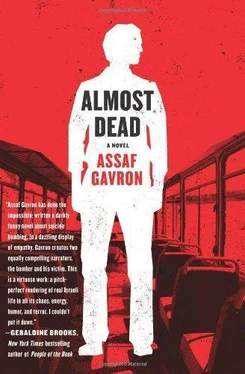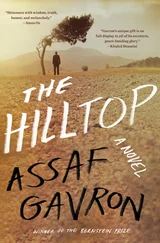The bomb was ready. Safi said, ‘Make another cup of tea,’ in his quiet voice, pushing the buttons of his mobile phone.
I immediately knew who she was. She was on her own.
The broken mother, the shocked father, sisters or friends crying bitterly, the minister the government had felt obliged to send, and whose name I forget, bespectacled, too European for this crowd, chubby, a Likudnik’s look in his soft eyes — and there she was on her own, in the corner of the congregation, with her straight black hair and her black eyes, her black coat, her black bag.
The close-packed crowd raised the temperature around the grave by a degree or two. Breath, body heat, traces of hot air blown through plastic car heaters still clinging to the mourners. You could see the steam rising up from them into a rain that fell without pause. I hadn’t brought a coat because it’s not cold in Tel Aviv. She looked up into the rain, stared straight into the drops while they landed on her face and eyes and mixed with her own tears and dissolving make-up.
‘Shuli?’
She looked at me, didn’t recognise me, and lowered her eyes. ‘Not now,’ she murmured, and I stepped back. The father’s voice had been crushed into gravel. And then the rabbi, with his clear loud voice, sang songs that he was convinced with all his heart reached the ears of God, whom he was convinced with all his heart existed, and whom he was convinced with all his heart belonged to him alone, who had chosen his people from all other nations, who had chosen from everything only him. ‘Ya, right’, as Duchi would have said.
Earlier, breakfast with my parents in Rehavia: toast and peanut butter and jam. Unsatisfactory filter coffee. Or maybe I was the unsatisfactory one. At home I drink decaffeinated filter. I went off caffeine as part of the time management and relaxation workshop I attended. I don’t remember how it’s related but it’s the only thing I took home from that workshop, apart from the group leader and time management expert Miriam’s mantra: ‘Each and every day we all get the same number of minutes’—and, Duchi of course, whom I met there.
Freshly squeezed orange juice and curious parental stares. Yochanan (Jonny) and Leah (Lili) Enoch. The peanut butter importer and the English teacher. She’s been teaching English in the same high school for thirty years, and I never stop asking myself, how can you do the same thing for thirty years — and will I need to as well? Mind you, maybe a permanent and secure job is better than convincing yourself that you’re going to introduce peanut butter to the natives of the Levant and monopolise the market. But, what can you do, the natives decided to do it on their own, and they even called it ‘Egozan’, which just means ‘nut spread’, a linguistic error which almost broke his heart. He turned to exporting, and then back to importing when it looked as if the market was opening up to American products at the end of the seventies. Eventually, when Dafdaf was born and it dawned on him that he had three children to provide for, and his mother in America had threatened to fly over and physically drag him back to Maryland if he didn’t get a proper job, Yochanan Enoch compromised and found work as a sales agent for the food giant Elite and thus found himself selling, among the other products he was responsible for getting on to the shelves of the supermarkets and groceries around Jerusalem, thousands upon thousands of jars of Egozan, the paste that broke his heart.
They read about the attack in Haaretz . The headline was: ‘On The Way To The City’. Twelve dead. It was thought that the terrorists, probably from Bethlehem or Hebron, had walked all night to escape. The radio was on, turned up very loud, voices talking about the victims and their funerals and about the funerals of the victims of the previous attacks.
‘Hold on.’ I stopped Dad, who was halfway through saying something. ‘ Giora Guetta’s funeral will leave the cemetery in Givat Shaul at ten. ’ I looked at my watch and apologised: ‘I’ve got to make a move.’ Their curious and worried looks followed me. Some other time, I thought; some other time I’ll tell them about being there last night and about the attack in Tel Aviv. And why I suddenly turned up out of the blue. And of course, I owed them an explanation for why Duchi and I hadn’t set a new date for a wedding. But I couldn’t deal with it now. There was no point, and it was hard enough for them anyway. They’d come to this hole in the desert to give themselves and their children an identity and a good life, and in return all they’d got was destruction.
At funerals you have the prayers, and then the silence, and then the sniffs. At first you don’t notice them; your ears filter them out. But once you become aware of them you realise they’re almost as loud as the rain. Hundreds of sniffs from all around you. It’s infectious. I sniffed too, though I scarcely knew Giora Guetta.
The minister spoke. He said something about the long arm (of the IDF) and the extended hand (of forgiveness). Outreach. That was the word. He said something about wretched creatures. He said something about forces beyond our understanding, and the sniffs said: Come on, shut up.
Giora’s younger brother talked about the light in his eyes, about innocence and kindness. About his modesty. I thought about the Giora I had met, with the showy honey-coloured hair and shades. I hadn’t seen any modesty there, but who knew, people have their untypical moments. Giora Guetta and I had known each other for about eight minutes and he’d said about thirty words to me. He’d said ‘He looks OK to you, right?’ and ‘Listen, if something happens to me, I want you to tell my girlfriend in Jerusalem, Shuli, I want you to tell her…’ and ‘I know nothing’s going to happen, but if it does…’ I hadn’t taken any of it seriously. It was an uncorrectable mistake.
The crowd started to disperse, though some remained for long minutes by the graveside. I stood a good way apart from everyone and watched Shuli out of the corner of my eye. She stood in the corner, separate, on her own. I decided I liked the high arches of her cheekbones. At last she turned and began to walk away. She had long legs and an upright way of walking. Self-assured, but not at the expense of tenderness, I thought. As she passed the fresh dirt of the grave, on which a wreath and a small sign with an image of a candelabrum and Giora’s name handwritten on it were laid, she halted for a few seconds and then went on, nodding to one or two friends but not speaking to the parents. At the heart of the little group that was left by the grave there was a girl who couldn’t stop crying. Guetta’s mother had her enfolded in a long hug. I assumed the sobbing girl was Guetta’s long-time girlfriend, possibly an ex, but still loved by his parents, thought of as a family member and recognised by friends as Giora’s girl. Shuli, I continued with my theory, was a recent addition. Hardly knew his parents, if at all. Giora had been too nervous to introduce her, because of the sobbing girl. But my script turned out to be wrong: so completely and utterly wrong it ended up breaking the ice with Shuli, because when she heard it she laughed for the first time in two days.
I caught up with her as she was walking from the grave to the car park, measuring her steps carefully on the steep gradient, her eyes on the path.
‘Are you Shuli?’
I fell into step beside her and she looked at me. Pretty eyes.
‘Who are you?’
‘I saw Giora just before…’
‘He’s dead.’
‘I know.’
Silence. A pretty voice, too. She kept her eyes lowered. I was panting a little with the incline. The Mountain of Rest, they call the cemetery in Jerusalem, and it really is a mountain: a whole hill of the dead.
Читать дальше












